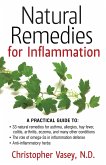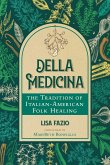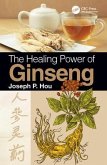20,99 €
inkl. MwSt.
Versandfertig in über 4 Wochen

10 °P sammeln
- Broschiertes Buch
- Merkliste
- Auf die Merkliste
- Bewerten Bewerten
- Teilen
- Produkt teilen
- Produkterinnerung
- Produkterinnerung
An updated and expanded edition of the definitive guide to adaptogenic herbs
Andere Kunden interessierten sich auch für
![Adaptogens in Medical Herbalism Adaptogens in Medical Herbalism]() Donald R. YanceAdaptogens in Medical Herbalism47,99 €
Donald R. YanceAdaptogens in Medical Herbalism47,99 €![The Herbal Medicine-Maker's Handbook The Herbal Medicine-Maker's Handbook]() James GreenThe Herbal Medicine-Maker's Handbook30,99 €
James GreenThe Herbal Medicine-Maker's Handbook30,99 €![Vibrant Botanicals: Transformational Recipes Using Adaptogens & Other Healing Herbs [A Cookbook] Vibrant Botanicals: Transformational Recipes Using Adaptogens & Other Healing Herbs [A Cookbook]]() Jennifer McgrutherVibrant Botanicals: Transformational Recipes Using Adaptogens & Other Healing Herbs [A Cookbook]30,99 €
Jennifer McgrutherVibrant Botanicals: Transformational Recipes Using Adaptogens & Other Healing Herbs [A Cookbook]30,99 €![Nature's Remedies for Stress and Fatigue Nature's Remedies for Stress and Fatigue]() Jo DunbarNature's Remedies for Stress and Fatigue22,99 €
Jo DunbarNature's Remedies for Stress and Fatigue22,99 €![Natural Remedies for Inflammation Natural Remedies for Inflammation]() Christopher VaseyNatural Remedies for Inflammation20,99 €
Christopher VaseyNatural Remedies for Inflammation20,99 €![Della Medicina Della Medicina]() Lisa FazioDella Medicina20,99 €
Lisa FazioDella Medicina20,99 €![The Healing Power of Ginseng The Healing Power of Ginseng]() Joseph P. HouThe Healing Power of Ginseng54,99 €
Joseph P. HouThe Healing Power of Ginseng54,99 €-
-
-
An updated and expanded edition of the definitive guide to adaptogenic herbs
Hinweis: Dieser Artikel kann nur an eine deutsche Lieferadresse ausgeliefert werden.
Hinweis: Dieser Artikel kann nur an eine deutsche Lieferadresse ausgeliefert werden.
Produktdetails
- Produktdetails
- Verlag: Inner Traditions Bear and Company
- 2nd Edition, Updated and Expanded Edition
- Seitenzahl: 432
- Erscheinungstermin: 17. September 2019
- Englisch
- Abmessung: 231mm x 150mm x 25mm
- Gewicht: 590g
- ISBN-13: 9781620559581
- ISBN-10: 1620559587
- Artikelnr.: 55174895
- Herstellerkennzeichnung
- Libri GmbH
- Europaallee 1
- 36244 Bad Hersfeld
- gpsr@libri.de
- Verlag: Inner Traditions Bear and Company
- 2nd Edition, Updated and Expanded Edition
- Seitenzahl: 432
- Erscheinungstermin: 17. September 2019
- Englisch
- Abmessung: 231mm x 150mm x 25mm
- Gewicht: 590g
- ISBN-13: 9781620559581
- ISBN-10: 1620559587
- Artikelnr.: 55174895
- Herstellerkennzeichnung
- Libri GmbH
- Europaallee 1
- 36244 Bad Hersfeld
- gpsr@libri.de
David Winston, RH(AHG), is an herbalist and ethnobotanist who has practiced Cherokee, Chinese, and Western herbal medicine since 1969. He is the president of Herbalist and Alchemist, Inc., a company that manufactures over 300 herbal products, author of Herbal Therapeutics and Saw Palmetto for Men & Women, and coauthor of Herbal Therapy and Supplements and Adaptogens. He lives in Bucks County, Pennsylvania.
Acknowledgments
Introduction
Part One: Herbal Adaptogens
1 Herbal Medicine around the World
2 Adaptogens: An Overview
3 History of Adaptogens
4 Actions of Adaptogens
5 Adaptogens and the Stress Response
6 Health Benefits of Adaptogens
Part Two: Materia Medica
7 Monographs on Adaptogens
Well-Researched Adaptogens
American Ginseng • Ashwagandha • Asian Ginseng • Cordyceps • Eleuthero •
Rhaponticum • Rhodiola • Schisandra • Shilajit
Probable Adaptogens
Cistanche • Cynomorium • Holy Basil • Morinda • Shatavari
Possible Adaptogens
Codonopsis • Guduchi • Horny Goat Weed • Jiaogulan • Licorice • Maca •
Manchurian Aralia • Prince Seng • Reishi • Russian Devil’s Club • White
Bryony
8 Nervines: Complementary Herbs for Adaptogens
Betony • Blue Vervain • Chamomile • Fresh Milky Oat • Hawthorn • Lemon Balm
• Linden • Mimosa • Motherwort • Passionflower • Skullcap • St. John’s Wort
9 Nootropics: Complementary Herbs for Adaptogens
Bacopa • Bhringraj • Chinese Polygala • Ginkgo • Gotu Kola • Lavender •
Rosemary • Shankhpushpi • White Peony
10 Restorative Tonics: Complementary Herbs for Adaptogens
Amla • Astragalus • Bee Pollen • Chyawanprash • Goji Berry • Nettle Seed •
Processed Rehmannia • Saw Palmetto • Suma
Part Three: Herbal Adaptogens in Use
11 Clinical Use of Adaptogens
12 Adaptogenic Herbs in Combination
13 Adaptogens and Restorative Tonics as Food
14 Adaptogens for Animals Resources
Glossary
Bibliography
Index
Introduction
Part One: Herbal Adaptogens
1 Herbal Medicine around the World
2 Adaptogens: An Overview
3 History of Adaptogens
4 Actions of Adaptogens
5 Adaptogens and the Stress Response
6 Health Benefits of Adaptogens
Part Two: Materia Medica
7 Monographs on Adaptogens
Well-Researched Adaptogens
American Ginseng • Ashwagandha • Asian Ginseng • Cordyceps • Eleuthero •
Rhaponticum • Rhodiola • Schisandra • Shilajit
Probable Adaptogens
Cistanche • Cynomorium • Holy Basil • Morinda • Shatavari
Possible Adaptogens
Codonopsis • Guduchi • Horny Goat Weed • Jiaogulan • Licorice • Maca •
Manchurian Aralia • Prince Seng • Reishi • Russian Devil’s Club • White
Bryony
8 Nervines: Complementary Herbs for Adaptogens
Betony • Blue Vervain • Chamomile • Fresh Milky Oat • Hawthorn • Lemon Balm
• Linden • Mimosa • Motherwort • Passionflower • Skullcap • St. John’s Wort
9 Nootropics: Complementary Herbs for Adaptogens
Bacopa • Bhringraj • Chinese Polygala • Ginkgo • Gotu Kola • Lavender •
Rosemary • Shankhpushpi • White Peony
10 Restorative Tonics: Complementary Herbs for Adaptogens
Amla • Astragalus • Bee Pollen • Chyawanprash • Goji Berry • Nettle Seed •
Processed Rehmannia • Saw Palmetto • Suma
Part Three: Herbal Adaptogens in Use
11 Clinical Use of Adaptogens
12 Adaptogenic Herbs in Combination
13 Adaptogens and Restorative Tonics as Food
14 Adaptogens for Animals Resources
Glossary
Bibliography
Index
Acknowledgments
Introduction
Part One: Herbal Adaptogens
1 Herbal Medicine around the World
2 Adaptogens: An Overview
3 History of Adaptogens
4 Actions of Adaptogens
5 Adaptogens and the Stress Response
6 Health Benefits of Adaptogens
Part Two: Materia Medica
7 Monographs on Adaptogens
Well-Researched Adaptogens
American Ginseng • Ashwagandha • Asian Ginseng • Cordyceps • Eleuthero •
Rhaponticum • Rhodiola • Schisandra • Shilajit
Probable Adaptogens
Cistanche • Cynomorium • Holy Basil • Morinda • Shatavari
Possible Adaptogens
Codonopsis • Guduchi • Horny Goat Weed • Jiaogulan • Licorice • Maca •
Manchurian Aralia • Prince Seng • Reishi • Russian Devil’s Club • White
Bryony
8 Nervines: Complementary Herbs for Adaptogens
Betony • Blue Vervain • Chamomile • Fresh Milky Oat • Hawthorn • Lemon Balm
• Linden • Mimosa • Motherwort • Passionflower • Skullcap • St. John’s Wort
9 Nootropics: Complementary Herbs for Adaptogens
Bacopa • Bhringraj • Chinese Polygala • Ginkgo • Gotu Kola • Lavender •
Rosemary • Shankhpushpi • White Peony
10 Restorative Tonics: Complementary Herbs for Adaptogens
Amla • Astragalus • Bee Pollen • Chyawanprash • Goji Berry • Nettle Seed •
Processed Rehmannia • Saw Palmetto • Suma
Part Three: Herbal Adaptogens in Use
11 Clinical Use of Adaptogens
12 Adaptogenic Herbs in Combination
13 Adaptogens and Restorative Tonics as Food
14 Adaptogens for Animals Resources
Glossary
Bibliography
Index
Introduction
Part One: Herbal Adaptogens
1 Herbal Medicine around the World
2 Adaptogens: An Overview
3 History of Adaptogens
4 Actions of Adaptogens
5 Adaptogens and the Stress Response
6 Health Benefits of Adaptogens
Part Two: Materia Medica
7 Monographs on Adaptogens
Well-Researched Adaptogens
American Ginseng • Ashwagandha • Asian Ginseng • Cordyceps • Eleuthero •
Rhaponticum • Rhodiola • Schisandra • Shilajit
Probable Adaptogens
Cistanche • Cynomorium • Holy Basil • Morinda • Shatavari
Possible Adaptogens
Codonopsis • Guduchi • Horny Goat Weed • Jiaogulan • Licorice • Maca •
Manchurian Aralia • Prince Seng • Reishi • Russian Devil’s Club • White
Bryony
8 Nervines: Complementary Herbs for Adaptogens
Betony • Blue Vervain • Chamomile • Fresh Milky Oat • Hawthorn • Lemon Balm
• Linden • Mimosa • Motherwort • Passionflower • Skullcap • St. John’s Wort
9 Nootropics: Complementary Herbs for Adaptogens
Bacopa • Bhringraj • Chinese Polygala • Ginkgo • Gotu Kola • Lavender •
Rosemary • Shankhpushpi • White Peony
10 Restorative Tonics: Complementary Herbs for Adaptogens
Amla • Astragalus • Bee Pollen • Chyawanprash • Goji Berry • Nettle Seed •
Processed Rehmannia • Saw Palmetto • Suma
Part Three: Herbal Adaptogens in Use
11 Clinical Use of Adaptogens
12 Adaptogenic Herbs in Combination
13 Adaptogens and Restorative Tonics as Food
14 Adaptogens for Animals Resources
Glossary
Bibliography
Index
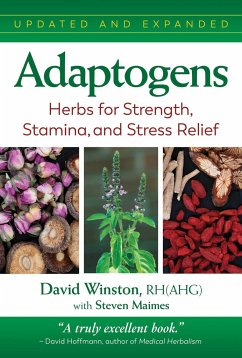
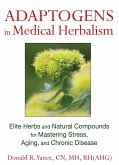
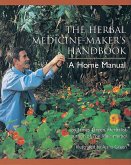
![Vibrant Botanicals: Transformational Recipes Using Adaptogens & Other Healing Herbs [A Cookbook] Vibrant Botanicals: Transformational Recipes Using Adaptogens & Other Healing Herbs [A Cookbook]](https://bilder.buecher.de/produkte/59/59504/59504017m.jpg)

